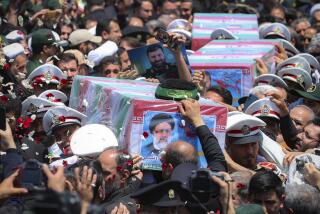Anglican Leader Sees Iranian Official : War Truce Raises Hopes of Freedom for Hostages in Lebanon
- Share via
NICOSIA, Cyprus — The Archbishop of Canterbury has conferred with a senior Iranian official in London, it was disclosed Thursday, fueling hopes that Iran’s acceptance of a truce in the Persian Gulf War will bring a change of policy on the issue of Western hostages being held in Lebanon.
For the last three weeks, speculation has been building in Washington and other Western capitals that a breakthrough on the hostages may be in prospect.
That is based in part on Iran’s surprise agreement July 18 to accept a U.N.-mandated cease-fire in its eight-year war with Iran. The cease-fire is scheduled to officially begin Aug. 20. At the same time, Iran is attempting to improve its relations with the West after a long chill and to obtain assistance for rebuilding, suggesting that Tehran now has a good incentive to act for the release of the hostages.
Foreign hostages held in Lebanon number 18, including nine Americans, three Britons and a West German. Western officials believe that all are held by Hezbollah (Party of God), which is widely thought to be financed and led by Iranian Revolutionary Guards.
The Archbishop of Canterbury, Robert A. K. Runcie, met Wednesday night with Mohammed Reza Said Mohamedi, a senior Iranian diplomat. The talks are believed to have focused on efforts to free Runcie’s special envoy, Terry Waite, who was kidnaped in Beirut on Jan. 20, 1987, during the last of several trips he made there to try to get the hostages released.
“I believe that everyone who is genuinely concerned about the improvement of Anglo-Iranian relations and about the British hostages in Lebanon will recognize that there are times when progress can only be made quietly,” Runcie said.
Iran’s charge d’affaires in London, Akhoond Basti, said after Runcie’s meeting, “If there is good will on all sides, the fate of the hostages will be resolved forever.”
‘Small Step, Long Road’
Terry Waite’s cousin, John Waite, commented, “I think this is a small step on a long road that hopefully will lead to the release of all hostages.”
Bilateral relations between London and Tehran are on the mend, with a British Foreign Office envoy, David Reddaway, due to travel to Iran today for a visit of several weeks and with an agreement having been reached between the two countries to compensate each other for damage done to their respective embassy buildings.
Diplomats in the Persian Gulf region and in London cautioned Thursday that it was still too early to predict that the improvements would lead to a release of hostages. In particular, the diplomats said, it is clear that Iran still differentiates between Britain and the United States in political terms.
On July 26, the powerful Speaker of Iran’s Parliament, Hashemi Rafsanjani, said Tehran was prepared to use its influence to free the American hostages in Lebanon if the United States would release an estimated $1 billion in frozen Iranian assets in the United States.
The White House immediately rejected linking of the hostage issue to arms deliveries, a matter of embarrassment to the Reagan Administration after the Iran-Contra scandal, in which it was disclosed that arms were sent to the Iranians in 1985 and 1986 in an attempt to obtain freedom for hostages.
There appears little doubt that Iran has exercised direct control over the hostages. As recently as May 4, three French hostages were released in Beirut after France normalized relations with Iran and paid an estimated $300 million that France owed the Iranians.
Western officials have raised their hopes about the hostages on the theory that Iran’s decision to end its war with Iraq signified that moderate elements of the Tehran government have the upper hand in a continuing power struggle.
London’s case for getting the British hostages freed appears easier than that of the United States, which has been painted as a “Great Satan” both in Iran and in Shia Muslim quarters in Lebanon, largely because of years of propaganda by Iran’s spiritual leader, the Ayatollah Ruhollah Khomeini.
Now that they have settled the dispute over damage to their respective embassies, Britain and Iran face no major impediments to improved relations.
An editorial in Thursday’s Tehran Times shed an intriguing light on what Iran hoped to achieve from improved relations with London.
“Iran . . . has two major expectations,” the newspaper said. “Firstly, as Britain is soon to assume the rotating Security Council presidency, Iran expects Britain to meet Tehran’s logical demands on the basis of Resolution 598 and especially its sixth paragraph.”
This refers to the U.N. Security Council resolution of July, 1987, demanding a cease-fire in dhe Persian Gulf War. Its sixth paragraph calls for an impartial panel to assess responsibility for starting the conflict, which Iran clearly expects to be blamed on Iraq.
“Secondly, now that London’s military presence in the Persian Gulf is stripped of its former motives, Britain should seriously consider the withdrawal of its fleet from the Persian Gulf, and this will be a tangible token of Britain’s good will,” the newspaper said.
More to Read
Sign up for Essential California
The most important California stories and recommendations in your inbox every morning.
You may occasionally receive promotional content from the Los Angeles Times.













